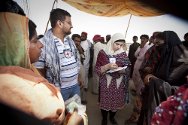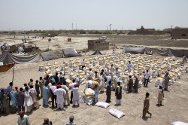Pakistan: grappling with the many challenges caused by insecurity
27-05-2011 Operational Update
Military operations in Khyber Pakhtunkhwa province and the Federally Administered Tribal Areas, and a significant escalation in suicide attacks against the security forces and foreign interests in major cities, are taking a heavy toll on civilians.
Military operations that have taken place this year in Mohmand Agency have caused considerable displacement of civilians in the region and limited access for humanitarian organizations attempting to provide much-needed relief for civilian victims.
Suicide attacks carried out this year in major cities have inevitably resulted in casualties among bystanders. Even attacks directly targeting the security forces have produced civilian casualties. The higher frequency and severity of attacks in the last month have led to yet more uncertainty and misery for civilians caught up in the fighting.
"We continue to provide quality emergency health care at our surgical hospital in Peshawar for those injured in such incidents," said Pascal Cuttat, head of the ICRC delegation in Islamabad. "We provide supplies for Pakistan Red Crescent Society emergency teams responding to these emergencies."
"Nevertheless, even though there is a clear need to step up humanitarian activities in many parts of the country, restrictions on access make it difficult to help those most in need," he added.
Providing health care
The ICRC continues to provide treatment for weapon-wounded patients from Afghanistan at three private clinics in Quetta. An expatriate health delegate and surgeon posted in the area works together with a national doctor, a physiotherapist and a liaison officer.
The ICRC surgical hospital in Peshawar provided treatment for nearly 200 weapon-wounded inpatients and over 230 outpatients during the months of March and April. A total of 20 international and 180 national staff are currently providing medical services in the hospital. Overall annual patient numbers have risen consistently each year since the hospital opened with a 20% increase recorded already in 2011.
Under a separate health programme run from Peshawar, medicines are regularly supplied to five local hospitals and two basic health-care facilities in Khyber Pakhtunkhwa and the Federally Administered Tribal Areas serving 95,000 people.
The ICRC is also maintaining support for seven basic health-care facilities run by the Pakistan Red Crescent in Balochistan, Khyber Pakhtunkhwa and the Federally Administered Tribal Areas.
Over the past three months, the ICRC has also responded to various requests for medical supplies from hospitals, clinics and other facilities. It has provided first-aid training through the Pakistan Red Crescent for 72 medical and paramedical staff in Khyber Pakhtunkhwa and the Federally Administered Tribal Areas. It also provided seven doctors and technicians from the Federally Administered Tribal Areas with specialized training in techniques for the treatment of patients with weapon-related injuries.
In March and April, health-care facilities receiving ICRC support admitted nearly 7,000 patients and also provided services for over 46,000 outpatients.
Providing artificial limbs and physiotherapy services
At its three physical rehabilitation centres in Peshawar, Quetta and Muzaffarabad, the ICRC continues to provide prosthetic devices and physiotherapy services for people who have lost limbs in fighting or other weapon-related incidents. In March and April, the three centres provided services for over 2,400 patients.
Standing by flood victims
With flood recovery well under way, many flood-stricken communities of northern Sindh province feel their problems have been largely forgotten. However, even though almost 12 months have passed since they were hit by devastating floods, it is only now that they are able to seriously think about re-occupying their land and planting the summer rice crop.
The ICRC has continued to support these communities by providing monthly food rations for more than 220,000 people since January 2011. In the last week, in Jacobabad district's Ghari Khero Tehsil, one of the communities hardest hit by flooding, the ICRC commenced the distribution of seed, fertilizer and tools to enable crops to be planted.
The area is well known for its rice cultivation. With the growing season approaching, the ICRC started distributing rice seed, fertilizer and tools to villagers in six union councils. No fewer than 6,505 families – nearly 40,000 people – have received the items so far. In total, some 170,000 people will benefit. A standard package includes 50 kg of rice seeds, 150 kg of fertilizers and a tool kit.
Providing food and other essential items
The ICRC continues to provide people in Hangu displaced by fighting in Kurram and Orakzai Agencies with food and other essential items. Some 230,000 people receive a monthly food ration. This month, 20,000 newly displaced people were given food and other essentials for the first time.
Rebuilding livelihoods
The ICRC is running a micro-economic grant programme in Khyber Pakhtunkhwa that has disbursed 269 grants to help people start small business ventures in the districts of Buner and Dir, and within Bagh and Haveli in Pakistan-administered Kashmir.
In view of the scarcity of employment opportunities in fighting-affected areas, the ICRC is engaging more and more local skilled and unskilled workers in community projects funded to provide temporary employment. In the last three months, 459 workers have been paid for work they carried out upgrading or rebuilding pedestrian paths and irrigation channels.
As part of a project designed to benefit widow-led families, 29 cows with calves have been distributed in District Buner of Khyber Pakhtunkhwa. Over 5,000 kilograms of dairy feed and nearly 60 kilograms of minerals have also been provided. The people receiving the aid can look forward to stable long-term income from the sale of milk and meat.
Improving water and sanitation services
Between March and May the ICRC maintained its effort to upgrade 13 rural and urban water supply schemes in the districts of Lower Dir, Swat, Buner and Bajaur, and in Mohmand Agency. The ICRC also pressed ahead with work undertaken to upgrade the basic health unit facility at Khar, in Bajaur Agency.
ICRC staff remained busy improving water and sanitation facilities in prisons of Sindh. Between March and May, the ICRC:
- completed improvements to the water supply system at Central Jail Adiala, Rawalpindi;
- finished building a water supply and distribution system for the 50-bed hospital at Central Jail Karachi;
- continued work on a water distribution system for the barracks at Central Jail Karachi;
- carried out a detailed technical assessment of the water supply and sewerage systems for Malir District Jail;
- completed two bore holes sunk for the drinking water supply in Hyderabad District Jail;
- continued efforts to improve the water supply system at Central Jail Sukkur;
- donated equipment to be used for the improvement of sanitation and medical waste management at Sukkur Central Jail No. 2 and Khairpur Central Jail.
Visiting jails and restoring contact between family members
Currently the ICRC visits prisoners in Sindh Province, as well as in Pakistan-administered Kashmir and Gilgit-Baltistan, in order to assess conditions of detention and treatment, and to bring support in areas where it can make a difference. In addition to improving water and sanitation services in prisons (see above), it facilitates restoring contact between detainees and their families and supports authorities to strengthen their capacity to manage prisons.
Between March and May, ICRC staff:
- carried out visits to seven places of detention holding almost 5,400 detainees, including women and juveniles in Sindh;
- collected 81 and distributed 89 Red Cross messages, mostly between detainees and their families;
- arranged for 46 video telephone calls to be made between individuals held in detention centres in Guantanamo Bay and Bagram and their families in Pakistan;
- successfully resolved four tracing cases and accepted two new ones. The ICRC has 138 tracing cases currently pending.
Working in partnership with the Pakistan Red Crescent Society
The ICRC, one of the key partners of the Pakistan Red Crescent Society, helps the society to build capacity and provides it with financial and other support.
Between March and May the ICRC:
- carried out an internal displacement and camp management project review with the national headquarters and the Khyber Pakhtunkhwa branch of the Pakistan Red Crescent;
- provided support for a two-day first aid/emergency preparedness and response workshop for provincial and state branches of the Pakistan Red Crescent as part of a national review;
- provided support for a two-day national conference organized by the Pakistan Red Crescent entitled "Mega Disasters of Pakistan: Lessons Learnt – Way Forward";
- worked closely with Pakistan Red Crescent volunteers to distribute food and seed in support of displaced people in the north-west of the country, and to promote flood recovery efforts in northern Sindh.
For further information, please contact:
Michael O’Brien, ICRC Islamabad, tel: +92 300 850 8138
Christian Cardon, ICRC Geneva, tel: +41 22 730 24 26 or +41 79 251 93 02


